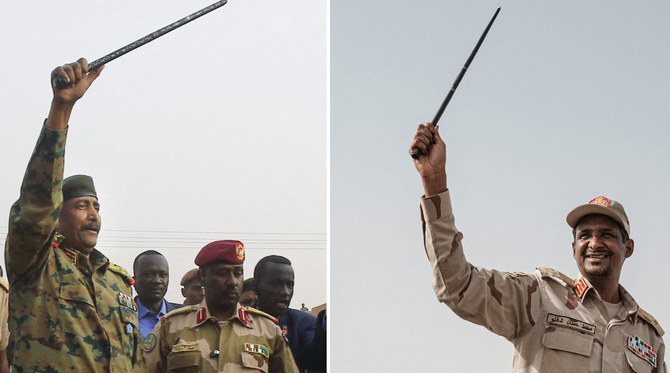There were doubts about the commitment of the Sudanese Armed Forces (SAF) and its partner in the Sovereign Council, the Rapid Support Forces’ (RSF), to the cause of democracy and the establishment of a transition government led by a civilian. After the October 2021 coup that led to the formation of the Sovereign Council, it took more than a year for Sudan’s coup leaders and the main pro-democracy group, Forces for the Declaration of Freedom and Change, to sign the December 2022 Framework Agreement to establish a transition government.
Most political entities and pro-democracy groups boycotted the agreement precisely because of a lack of faith in the sincerity of the Sovereign Council led by Gen. Abdel Fattah Al Burhan of SAF and Gen. Mohammed Hamdan Dagalo of RSF. The agreement was facilitated by the governments of the United States, the United Arab Emirates, Saudi Arabia and the United Kingdom.
And as recent events are beginning to prove, the processes leading to the signing of the agreement were shambolic, at best. Worse, the two generals who committed to the agreement had widely conflicting ambitions that had nothing to do with democracy or the best interest of the people of Sudan. And the pro-democracy groups that boycotted the process and raised doubts about the vague wording, giving too much to the military leaders to consolidate their hold on power in the document that was signed now appear justified. The foreign powers that facilitated the agreement were either too focused on outcomes they believed would best serve their interests or were willfully oblivious of the tell-tale signs that the power-sharing understanding between the two generals, like in South Sudan, was a hinderance to peace and the transition to democracy.
But it wasn’t only political parties and pro-democracy groups that boycotted the process, former rebel leaders with their own political bloc, have also rejected the deal. Earlier, a deal in 2020 with the previous transitional government, which was toppled in 2021, had made peace with several rebels in some Sudan’s troubled provinces. In recent times, Sudan has seen an increase in inter-tribal violence in the country’s west and south. Nevertheless, the facilitating countries said in a joint statement issued after the signing, that: “A concerted effort to finalise negotiations and reach agreement quickly to form a new civilian-led government is essential to address Sudan’s urgent political, economic, security, and humanitarian challenges.”
Beyond the disagreement civil society groups had with the Sovereign Council, the real elephant in the room was how to integrate the Rapid Support Forces led by Dagalo, and estimated to be 50,000-strong, with the Sudanese Armed Forces. The only claim to power and a seat at the table Dagalo was his armed group, which for a decade now, has been a counterforce and a threat to the Sudanese Armed Forces. While the Burhan-led Armed forces wanted to RSF to integrate with military within two years, Dagalo wanted the process of integration to drag on for at least 10 years. As expected, talks broke down between the two groups and on April 15, 2023 spilled out onto the streets. Close to a decade ago, under the government of Omar Al Bashir, the same Sudanese Armed Forces rejected the incorporation of the RSF into the military and in 2017, the National Assembly adopted a law that affiliated the RSF with the SAF but gave it an autonomous structure and a separate chain of command. Al Bashir saw the RSF as a counterforce against military coups.
How Dagalo rose to power, commanding a large force is important if we must understand what is happening in Sudan, what it will take to bring peace to that country and put it back on a democratic path.
By the analysis of many observers, the tension between the Army and Dagalo is partly being stoked by loyalists of ousted ruler, Omar Al Bashir. The government of Sudan recruited tribal militias to fight rebels in Darfur going as far back as 2003. Those militias, then known as the Janjaweed were insignificant in numbers until Bashir built them further after the Justice and Equality Movement, a major Darfuri rebel group, attacked Khartoum in 2008. In essence, Dagalo rose to prominence after succeeding in the fight against Darfuri rebel groups and ending up as the new leader of a new force that superseded the Janjaweed, the Rapid Support Forces.
If anything can be learnt from South Sudan, it is that there cannot be lasting peace in Sudan with the existence of two rival forces, even under a power-sharing agreement. And the real casualty has been the will of the Sudanese people. There is, however, no denying that peace cannot be restored to Sudan without the support of the foreign powers that facilitated the agreement to return the country back to a transition process. And as much as the United States, United Arab Emirates, Saudi Arabia and Britain are reportedly now speaking with one voice, the reality is that they don’t all share the same vision for Sudan, especially when it comes to accommodating all of the components of the Sudanese society. There are also other outside players like Russia and neighbouring countries. And in the long run, only a democratic government can restore peace, security and economic prosperity to Sudan. But that seems to be some distance away.



